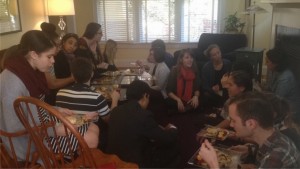Human Rights and DukeImmerse

I typically spend the majority of my time on East Campus now that the free food challenge is over. (Feel free to drop by my office to say hi.) However, this past Wednesday I found myself on West Campus, far from my familiar stomping grounds, to attend a lecture at the Law School. Klara Skrivankova, the head of the Europe Programme and Advocacy Coordinator at Anti-Slavery International, gave a talk on “Trafficking and the European Refugee/Migration Crisis.” First, she explained the difference between trafficked pers ons and smuggled migrants: smuggled migrants are not considered victims of crime. Then she examined the chaotic responses European nations have taken to the Syrian refugee crisis. The current opportunities for low-skill migrants to immigrate to Europe through legal pathways are limited. Thus, there has been an increase in smuggled migrants in recent years. Skrivankova questioned how the legal pathways to enter the European Union could be improved and redirected to reduce the number of smuggled migrants.
Skrivankova called for the creation of an international policy that would uniformly deal with the increased number of peoples wishing to cross borders. This policy is particularly needed in the EU, where vulnerable populations are being taken advantage of due to the scarceness of safe and legal methods of entry. The current piecemeal approach by European states in response to the refugee crisis, which includes funding corrupt governments to prevent the departure of their citizens for the EU, is an ineffective use of resources. Instead, a strong international legal framework for refugee resettlement and migration due to economic disparities would reduce human rights atrocities that currently occur.
I would not have been at the Klara Skrivankova lecture had it not been for my interest in refugee resettlement, sparked by the first class I had freshman year at Duke with Professor Suzanne Shanahan. It was titled The Limits of Obligation and was one of two classes I took in the Ethics, Leadership and Global Citizenship Focus Program fall semester 2011. This class introduced me to refugee and migration topics and inspired me to participate in DukeImmerse: Uprooted/Rerouted where I was one of twelve students who spent the month of March 2012 in the refugee camps of Nepal conducting life story interviews. This semester, Spring 2016, the fourth DukeImmerse: Uprooted/Rerouted program will send six students to Syrian refugee camps in Jordan to conduct life story interviews.

On Saturday, the new DukeImmerse students met with alumni of the Kenan Immerse programs from 2012, 2013 and 2014. There I recognized Julie Williams, one of the new DukeImmerse students, as an attendee earlier that week at the Klara Skrivankova talk. We discussed our common interest in refugees, her excitement about the spring travel to and immersion into the Jordanian refugee camps, and what I learned from the life story interviews I conducted with elderly Bhutanese living in the (now closed) Sanischare Camp in Nepal. I could feel our connection was an important part of Kenan’s continuing research into refugee migration. The population of focus this spring would be different than I had experienced, but I hoped that Julie, like me and my fellow Uprooted/Rerouted Immersers, will emerge from the semester of study and engagement with refugees prepared “to act and to educate, holding in our minds and hearts not just an understanding of refugee issues, but also all of the individual stories – the struggles and the tears, the friends and the children, the violence and the disorder, the rituals and the work – all the things that constitute [the refugee’s’] lives.”
-CGM
